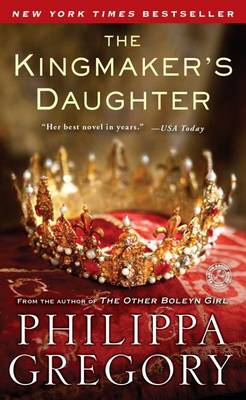Reviewed by gmcgregor on
For Isabel, that meant wedding Edward's younger brother George, the spoiled favorite always looking for a way to depose his brother. When an attempted rebellion in his favor was quelled, Warwick allied himself with the Lancasters, and married his younger daughter, Anne (whose perspective this book follows) to Edward of Westminster, the only child of the deposed Lancastrian King Henry VI. The uprising in support of the old king and then the young prince ultimately failed as well, and Anne was taken in by her sister and brother-in-law while her husband was executed. While Isabel eventually died in childbirth (as was unfortunately common in those days), Anne married her other brother-in-law...the youngest of the York sons, Richard. Richard eventually becomes King Richard III, making Anne the queen of England, as her father had once dreamed...but this triumph was undermined when her son, her only child, died around age 10. Anne's own death followed not long thereafter.
This is a solid, unspectacular entry in Gregory's series. She's helped by the fact that Anne's life was kind of bonkers, with her father's shifting alliances, her marriage into a family that she had known as sworn enemies her entire life, her lengthy confinement at her sister's hand and the escape she had to plot to marry Richard, the fact that she and her sister declared her mother legally dead and imprisoned her so they could seize their inheritance, her struggles to conceive, brief happiness on the throne and then a fade-out, made all the more sad by her husband's attention to his beautiful young niece, Princess Elizabeth York. Gregory doesn't give Anne a particularly big or compelling personality (she's kind of blandly plucky and determined), so it's fortunate there's a lot of plot to weave around her. Reading it just made me reflect on how trapped women of that era were in a lot of ways: Anne is constantly put into situations she doesn't want to be in because the men in her life (her father, her first husband, her brother-in-law, her second husband) decide to do whatever is best for them, and she just kind of has to deal with or plot to undermine them as best she can.
There are some quibbles I had with the way Gregory told her story: I thought the witchy woo-woo stuff with the Woodvilles that I find irritating was a little overdone, though it does track that a woman like Anne would have believed in it. And like I mention above, Anne's characterization isn't especially strong despite her position at the center of the story. For the most part, though, the plot trots along briskly and it's engaging and entertaining. If you're this far into this series, you've probably figured out what you're going to get from it, and this book neither delights or disappoints. Solid historical fluff read!
Reading updates
- Started reading
- 24 April, 2018: Finished reading
- 24 April, 2018: Reviewed
